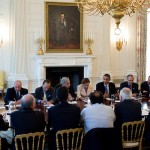….An undocumented immigrant in New York is deported while her daughter is in day care….A Haitian woman in Ohio is deported, leaving her husband to raise their three U.S.-born children. The husband became disabled and can’t work. The mother is injured in the Haiti earthquake….
It’s one heartbreaking story too many for the church to ignore. Now a coalition of clergymen, pastors and ministers are calling on the government to pass an immigration reform law that is “compassionate” and “moral.”
Speakers on a recent national conference call warned politicians running for midterm elections not to use immigration for political gain, and urged voters to “shame” and “rebuke” those who do.
“Jesus said the way we treat strangers is the way we treat Him,” said Rev. Jim Wallis at a June 24 teleconference titled “Faithful Perspectives: A Conversation on Immigration and Your Congregation,” organized by Sojourners, a Christian group based in Washington, DC that Wallis heads.
For many church leaders, immigration is viewed as a pastoral rather than a political issue. The estimated 11-12 million undocumented immigrants in the U.S. are “our people,” Wallis said–the congregants who attend services, receive communion, and pray at churches. That’s why, he added, immigration enforcement that breaks up families is “unacceptable to us.”
Increasingly, religious groups are becoming outspoken advocates for immigration reform, and critics of harsh laws such as Arizona’s SB 1070.
Rev. Gabriel Salguero of the multicultural Lamb’s Church of the Nazarene in New York, said the clergy cannot help being involved because their congregation seeks them out for guidance and advice.
“Our parishioners say they feel comfortable talking with the clergy,” he said. “There is overwhelming hunger for discussion [on immigration] from the pew.”
In another reference to the immigrant as the “stranger” Jesus instructed Christians to embrace, Salguero said, “If we want to obey the rule of law and welcome that stranger, why don’t we enact laws that speak of love of neighbor?” He stressed that society needs to hold the government and its officials to higher moral standards.
Catholic and evangelical churches have become forums for the immigration debate not only due to scripture–but because of the population filling their pews.
Rev. Rich Nathan of the Vineyard Church of Columbus, Ohio said immigrants from 92 countries form his congregation. He said he didn’t know the extent of his parish’s diversity until he began hearing stories of folks being “rounded up” because of immigration.
Rev. Nathan asks an immigrant in his congregation to do a responsive reading of the Scriptures in his or her native language every month. Through this segment, he said “People see these folks in front of them as being part of them.”
As a pastor, he said his response has always been to “shape the inclination of people’s hearts” towards greater understanding of people in need. He cautioned people about using hurtful language to refer to immigrants, saying slanderous language robs people of their dignity.
“We need careful use of language,” he said. “When we call foreigners ‘gatecrashers’ or ‘parasites’ or ‘wetbacks’ or ‘pariahs,’ that’s slanderous and attacking the image of God.”
The American immigration debate, said Angela Kelley of the Center for American Progress (CAP) a public policy research organization, has been clouded in misunderstanding. She says there are many ways immigrants enter the country legally – through family, through employment, or as asylum seekers – but over the years the rules have become tighter.
Kelley said 40 percent of undocumented immigrants entered the U.S. legally and overstayed their visas, and that nearly half are couples with children–either born in the U.S. or brought here as young migrants. That family connection is “at the heart of the comprehensive immigration reform debate.”
It’s also a core Christian value, says Jenny Hwang of World Relief, a Christian aid organization. “Keeping families together is of utmost importance to many in the faith community,” wrote Hwang, in an article titled, ‘Arizona’s Anti-Immigration Law is also Anti-Faith.’ “Families are the building blocks through which individuals are able to grow and stabilize within society.”





